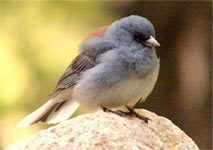 Male dark-eyed juncos with higher levels of testosterone become more attractive to females, enabling them to fly farther and sing better.
Male dark-eyed juncos with higher levels of testosterone become more attractive to females, enabling them to fly farther and sing better.
These testosterone-rich males also produce more offspring. However, Wendy Reed, an assistant professor of biology at the University of North Dakota, found that the chicks born to high-testosterone fathers are smaller and less likely to survive.
The testosterone levels make dark-eyed juncos more susceptible to disease and decrease their lifespan. “They have weaker immune systems and pay the price with lower survival rates,” Reed stated.
High testosterone levels also turn these male birds into poor fathers. They visit the nest less frequently, bring less food, and spend less time with their young.
Reed’s team observed over 400 junco nests in the Appalachian Mountains of Virginia over nine breeding seasons. These birds are characterized by bright chests, small beaks, and darker head and wing feathers.
A group of dark-eyed juncos was implanted with testosterone-filled tubes under their skin to increase their male hormone levels.
“Generally, younger male birds have lower testosterone levels than older ones and are less flirtatious, sing weaker songs, and have duller plumage.”
Supplementing testosterone makes the birds more aggressive—they become more active overall, but with higher stress hormone levels. This can suppress the immune system, and overactivity may attract predators.
“Although testosterone-supplemented young birds behave like older ones, they do not achieve the same productivity. Young males have fewer offspring, lower reproductive success, and shorter lifespans compared to older birds.”
M.T.

















































